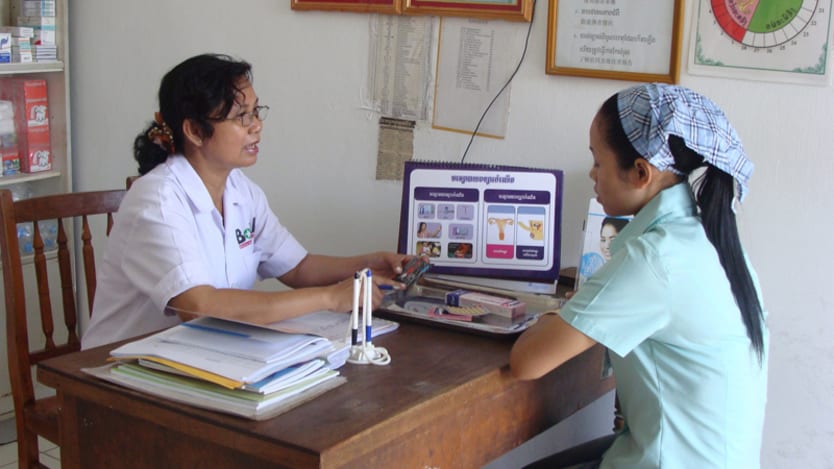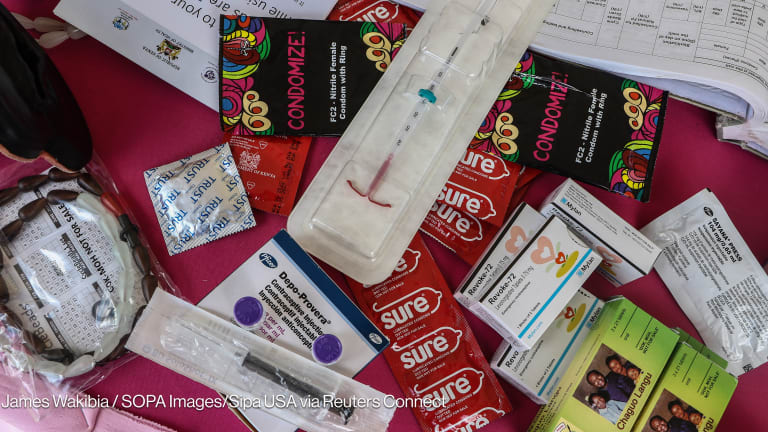Will a new campaign convince Australia to step up at the Family Planning Summit?

With support from the United Nations Population Fund, the Bill & Melinda Gates Foundation and the United Kingdom's Department for International Development, the Family Planning Summit in London on July 11 is expected to be show of political and financial opposition to the “global gag rule” reintroduced by the Trump administration in January.
For NGOs providing family planning support and services in the Indo-Pacific region, Australia’s contribution and response to the summit will be watched closely.
Despite a strong show of global support for sexual and reproductive health services since January, new donations are not necessarily filtering to the Pacific region, where the costs of operating any service, including family planning, can be excessive. Australia’s financial support through its aid program is important in ensuring crucial health care for women and children.
See more related topics:
► Europe alone cannot plug the family planning funding gap — Sweden's Modéer
► Global gag rule expected to hit safe abortion, contraceptive use in Nigeria
► In Colombia, 'global gag rule' punishes conflict-affected populations
► Plans for major family planning summit take shape in Europe as US cuts back
► Trump expands 'global gag rule,' targeting $8.8B in global health aid
The Australian aid program from the Department of Foreign Affairs and Trade prioritized gender equality — with a target of 80 percent of aid investment effectively addressing gender issues in their implementation. But investment of the aid budget into family planning has been contradictory to this policy. Since 2013, the budget for aid programs supporting family planning services has been halved from $46 million Australian dollars ($35 million) to $23 million Australian dollars ($17.5 million).
Now, there are concerns that the election of United States President Donald Trump is encouraging the conservative side of Australian politics to become even more vocal in their opposition of family planning in the aid program. In response, Australia’s International Sexual and Reproductive Health and Rights Consortium has begun a public campaign to drive awareness and support. They are urging Australians to email foreign minister Julie Bishop and contribute to the summit — both financially and politically.
Drivers behind the public push
The consortium is made up of 10 Australian NGOs supporting sexual and reproductive services in developing countries — the Asian Forum of Parliamentarians on Population and Development, the Burnet Institute, CARE Australia, Family Planning New South Wales, International Planned Parenthood Federation, International Women’s Development Agency, Marie Stopes International, Médecins Sans Frontières, Plan International Australia and Save the Children.
All were unified in their growing concern of support for family planning in Australian foreign aid.
“We’ve been in dialogue with the minister and other key politicians about aid funding generally, as well as support for family planning,” Chris Turner, executive officer for Marie Stopes Australia, explained to Devex. “That has been going on for a while. Going to the public is a new element to the strategy.”
While Australia invests an estimated $303 million Australian dollars ($230 million) annually into child and maternal health services and has extended support to the IPPF for the delivery of sexual and reproductive health services in crisis and post-crisis situations, the cuts to funding targeting sexual and reproductive health is impacting the ability to support women in the Indo-Pacific in making their own life choices. Yet benefits from family planning go beyond that.
“Funding family planning is probably the most practical means of achieving DFAT’s aims,” Turner said. “And it’s an inexpensive intervention compared to other areas DFAT would invest in, especially in the Pacific.”
Improved health to women and children and improved access to education and financial independence for women are among some of the benefits shown through investment in sexual and reproductive health — all important priority areas of the Australian aid program not adequately represented by its 8 percent contribution to the overall budget for maternal and child health programs.
“We identified that there has not been public dialogue, seen the drop off in family planning funding and it was time to engage the public in this discussion,” Turner said. “The U.S. is taking great criticism, and rightly so, for the Mexico City policy but meanwhile, Australia’s funding has always been less. We are lagging behind on both aid and family planning funding. It needs to change, and the Family Planning Summit is an important driver to shift Australia into a leadership position.”
Private sector is not a replacement for government funding
The campaign is asking for an additional $10 million Australian dollars ($7.5 million) annually, to see Australia contribute its “fair share.” For the Indo-Pacific region, this is money most governments in the region don’t have to fill in gaps of funding losses.
It is something Johanna Wicks, head of the Australian office of the International Planned Parenthood Federation, does not expect Australia’s private sector partners in the aid program to fill.
“Unfortunately, because of the baggage and ideology surrounding family planning it is much harder to get public sector engagement in this area,” she explained. “Most private sector organizations are not willing to have their brand associated with sexual and reproductive health. The automatic jump in thinking is to abortion — and because of this it is difficult to get a whole company on board and across the line.”
The cuts to family planning, Wicks believes, has not been driven by ideology but have rather been driven by the reduced official development assistance budget. But for family planning, government funding is irreplaceable. And for Australia, increased funding means their policy remains intact. “If the government does not commit to invest more in this area, it means the legacy from this amazing platform on women and girls is going to be at risk,” Wicks said.
Encouraging Australia’s involvement
The consortium has been actively engaging Australian media, including print and radio, to drive the issue home and encourage Australians to email Bishop. But in a country where development issues rarely make headlines, the consortium will be looking closely to the outcome of their first public campaign to determine whether family planning is better framed as a development issue or an issue for the rights of all women — wherever they are in the world.
“Speaking from Marie Stopes, we do approach this as a human rights issue fundamentally, so we see the issue that way,” Turner said. “Whether we could talk about it more that way publicly is a valid question. But for this campaign, the issue is framed around women’s economic empowerment to link directly to the priorities aid program.”
From Wicks’ experience, the promotion of family planning is stronger when it focuses on the untapped potential of women and girls. “If we give them their choices, they can go on to do transformative things with their lives,” she said. “This is a powerful message.”
A clear focus on development was important in creating a clear message that could be easily community by members of the consortium. “It’s a message we could all contribute to and be a part of,” Wicks said. And she believed is can also help target support. “This campaign is something people who feel passionately can do quickly and easily to voice their concerns about it.”
The government response
A spokesperson for DFAT explained to Devex that they were aware of the campaign, but no new announcements were to be expected at the summit.
“The Australian Government is maintaining its longstanding commitment to the promotion and delivery of sexual and reproductive health services,” the spokesperson said. “It is a priority in our foreign policy and aid program. We committed $303 million in funding for maternal and child health, including reproductive health care, in 2015-16. We continue to support the promotion and delivery of sexual and reproductive health services through our key partners such as the UNFPA. Australia also funds bilateral and regional programs to strengthen sexual and reproductive health services and policies including in Cambodia, Timor-Leste, Papua New Guinea, Vietnam and in the Pacific island countries.”
For Turner, the $10 million Australian dollar increase ($7.6 million) would have been a key element in the fight against unsafe abortions and teenage pregnancies in the Pacific region — which he calls “shocking” compared to sub-Saharan Africa.
And despite hopes that it would be Julie Bishop in attendance, Australia will be represented by Dr Sharman Stone, the ambassador for women and girls. While Stone is not in a position to make new announcements on funding, she is a strong and vocal advocate on the rights of women.
“A strong statement would send the message in terms of Australia’s position and role in the region,” Wicks said. “But I suspect that there may be some hesitation about a too bold statement in being potentially inflammatory to the opposition voices within parliament.”
Despite Australia not delivering for the campaign, the consortium are still enthusiastic about the Family Planning Summit and the support it will create.
“It’s going to be exciting and it would be great for Australia to be a part of it,” Turner said.
Read more international development news online, and subscribe to The Development Newswire to receive the latest from the world’s leading donors and decision-makers — emailed to you free every business day.
Search for articles
Most Read
- 1
- 2
- 3
- 4
- 5








